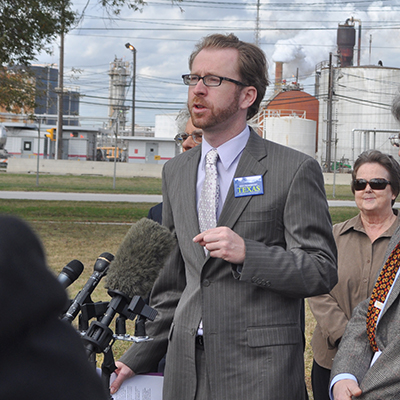
Pollution from LNG facilities in Texas
Catherine Fraser, Clean Air Associate for Environment Texas, joined the Environmental Integrity Project in the release of their report Troubled Waters for LNG. She spoke to the press about the air pollution from LNG construction and expansion projects in Texas and how that would impact the local community and how much air pollution already comes from LNG facilities in Texas, including from illegal air pollution incidents (“upsets”) during the most recent year available (which Environment Texas has studied).
My name is Catherine Fraser, and I’m the clean air associate with Environment Texas, a non-profit advocate for clean air, clean water, and open spaces.
Today, EIP’s report finds that if all 17 proposed LNG projects in the US are built, they could collectively release thousands of tons of dangerous air pollutants, including particulate matter, nitrogen oxides, volatile organic compounds, and sulfur dioxide. These chemicals can irritate the respiratory system, exacerbate asthma, and even cause cancer.
As we work to address the COVID-19 and climate crises, we need to stop the buildout of these super-polluting facilities that increasingly threaten our air, our water, and our climate.
Here in Texas we’re already seeing the impacts of these LNG facilities, as we have some operating in Jefferson, Brazoria, and San Patricio Counties. Past research from Environment Texas has shown that LNG facilities in Texas release thousands of pounds of unauthorized air pollution each year, on top of the pollution they’re already permitted to release.
In fact, Environment Texas’ annual air pollution report ranks an LNG facility in Corpus Christi, Corpus Christi Liquefaction, as the second-worst polluter of nitrogen oxides in the entire state in 2018, releasing nearly 200 thousands pounds in violation of their permits. For nearby residents, exposure to nitrogen oxides can cause eye and skin irritation, difficulty breathing, asthma and even harm to the reproductive system.
Air pollution from existing LNG facilities is already too much here in Texas. And now, with Texans dealing with the dual crises of climate change and the COVID-19 pandemic, we can’t afford to build out the rest of these proposed LNG projects here or across the country. We know that climate change worsens the impacts of air pollution, and, in turn, exposure to air pollution increases vulnerability to the coronavirus.
But with clean energy and modern technology, we can do things to reduce air pollution, mitigate climate change, and minimize our reliance on LNG and fossil fuels. No Texan should have to worry about toxic air pollution compounding ongoing threats of the coronavirus and climate change. Thank you.
Authors
Luke Metzger
Executive Director, Environment Texas
As the executive director of Environment Texas, Luke is a leading voice in the state for clean air and water, parks and wildlife, and a livable climate. Luke recently led the successful campaign to get the Texas Legislature and voters to invest $1 billion to buy land for new state parks. He also helped win permanent protection for the Christmas Mountains of Big Bend; helped compel Exxon, Shell and Chevron Phillips to cut air pollution at four Texas refineries and chemical plants; and got the Austin and Houston school districts to install filters on water fountains to protect children from lead in drinking water. The San Antonio Current has called Luke "long one of the most energetic and dedicated defenders of environmental issues in the state." He has been named one of the "Top Lobbyists for Causes" by Capitol Inside, received the President's Award from the Texas Recreation and Parks Society for his work to protect Texas parks. He is a board member of the Clean Air Force of Central Texas and an advisory board member of the Texas Tech University Masters of Public Administration program. Luke, his wife, son and daughters are working to visit every state park in Texas.

